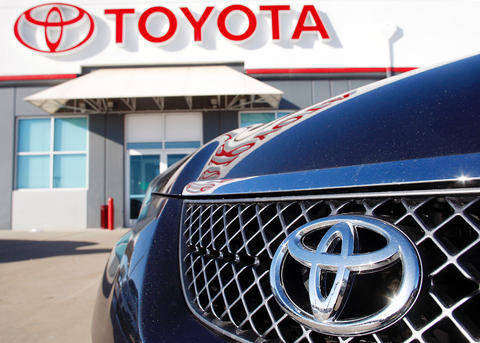General Motors Corp (GM) could be knocked from its longtime perch as the world's biggest automaker, if production estimates from Toyota Motor Corp for last year hold true.
GM said on Thursday it made 9.284 million vehicles worldwide last year, roughly 226,000 fewer than Toyota's production estimate of 9.51 million.
Toyota expects to have final numbers later this month, but issued the estimate on Dec. 25 with just six days left in the year.

PHOTO: AP
The real prize, the worldwide auto sales lead, also must still be determined, with both companies to release last year's global sales figures later this month.
GM chairman and chief executive Rick Wagoner said on Thursday in an Internet chat with journalists that the companies are in a race to be the top vehicle maker.
"As I recall, we lead in 13 of the 15 largest markets, but Toyota has a huge lead in Japan," Wagoner said. "We're staying focused on our plan. Great cars, smart marketing, growth in the emerging markets. And hopefully that will keep us on top. If not, we'll come back to work the next day and work even harder."
GM said its production figures included several joint ventures worldwide, including one with Toyota in California and ventures in Russia and China. Toyota's estimates include its Daihatsu small car and Hino truck operations.
GM has seen huge production growth outside of North America, offsetting a decline on its home turf.
In 2002, for example, GM's Asia-Pacific unit produced 307,000 vehicles, but that grew to 2.23 million last year. North American production fell from 5.64 million in 2002 to 4.27 million last year, figures posted on the company's Web site showed.
GM predicted nearly flat production worldwide in the first quarter of this year compared with the same period last year, saying it expects to build about 2.29 million vehicles. The Detroit automaker has not given a forecast for the number of vehicles it expects to produce or sell for the full year.
Aaron Bragman, an auto analyst with the consulting firm Global Insight in Troy, Michigan, said GM probably will not be able to reclaim the lead until North American auto markets, particularly the US, recover from a slump.
"North America really is their big story in terms of where the gap is," Bragman said. "They're growing everywhere else, just about."

The paramount chief of a volcanic island in Vanuatu yesterday said that he was “very impressed” by a UN court’s declaration that countries must tackle climate change. Vanuatu spearheaded the legal case at the International Court of Justice in The Hague, Netherlands, which on Wednesday ruled that countries have a duty to protect against the threat of a warming planet. “I’m very impressed,” George Bumseng, the top chief of the Pacific archipelago’s island of Ambrym, told reporters in the capital, Port Vila. “We have been waiting for this decision for a long time because we have been victims of this climate change for

MASSIVE LOSS: If the next recall votes also fail, it would signal that the administration of President William Lai would continue to face strong resistance within the legislature The results of recall votes yesterday dealt a blow to the Democratic Progressive Party’s (DPP) efforts to overturn the opposition-controlled legislature, as all 24 Chinese Nationalist Party (KMT) lawmakers survived the recall bids. Backed by President William Lai’s (賴清德) DPP, civic groups led the recall drive, seeking to remove 31 out of 39 KMT lawmakers from the 113-seat legislature, in which the KMT and the Taiwan People’s Party (TPP) together hold a majority with 62 seats, while the DPP holds 51 seats. The scale of the recall elections was unprecedented, with another seven KMT lawmakers facing similar votes on Aug. 23. For a

Taiwan must invest in artificial intelligence (AI) and robotics to keep abreast of the next technological leap toward automation, Vice President Hsiao Bi-khim (蕭美琴) said at the luanch ceremony of Taiwan AI and Robots Alliance yesterday. The world is on the cusp of a new industrial revolution centered on AI and robotics, which would likely lead to a thorough transformation of human society, she told an event marking the establishment of a national AI and robotics alliance in Taipei. The arrival of the next industrial revolution could be a matter of years, she said. The pace of automation in the global economy can

All 24 lawmakers of the main opposition Chinese Nationalists Party (KMT) on Saturday survived historical nationwide recall elections, ensuring that the KMT along with Taiwan People’s Party (TPP) lawmakers will maintain opposition control of the legislature. Recall votes against all 24 KMT lawmakers as well as Hsinchu Mayor Ann Kao (高虹安) and KMT legislative caucus whip Fu Kun-chi (傅崐萁) failed to pass, according to Central Election Commission (CEC) figures. In only six of the 24 recall votes did the ballots cast in favor of the recall even meet the threshold of 25 percent of eligible voters needed for the recall to pass,